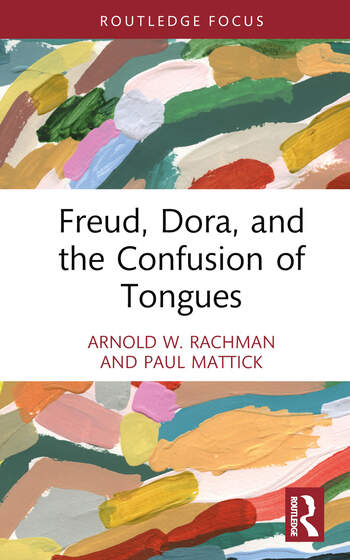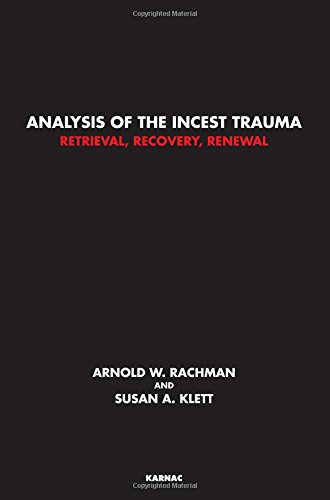Freud, Dora, and the Confusion of Tongues

Book Details
- Publisher : Routledge
- Published : February 2023
- Cover : Hardback
- Pages : 92
- Category :
Psychoanalysis - Catalogue No : 97059
- ISBN 13 : 9781032307718
- ISBN 10 : 9781032307
Also by Arnold W. Rachman
There are currently no reviews
Be the first to review
Responding to growing interest in issues of gender and power as they arise within psychoanalysis, Freud, Dora, and the Confusion of Tongues re-examines Freud’s iconic case of Dora from the perspective of Sandor Ferenczi’s investigation of the sexual manipulation of children by adults.
Freud believed that his analysis of Dora demonstrated the truth of his Oedipal theory; his treatment was based on interpretations of her statements as evidence of an unresolved Oedipal conflict. In contrast, Ferenczi’s Confusion of Tongues theory focused on the actual interactions between young people and adults who made use of their social status and power to substitute sexuality for the affection children desire. Where Freud located the origin of neurosis in psychological processes interior to the analysand, Ferenczi directed attention to the real traumatic aspects of the relationships between people. By such critical investigation, this book most strikingly shows that Freud’s imposition of his interpretations on Dora, despite his sincere wish to be of help to her, represented an abusive retraumatization.
Arguing that it is essential to understand linguistic and other representational systems of experience, and the interrelation between the reproduction and transformation of self, in a contemporary analysis of Dora’s case, this book will appeal to psychoanalysts, philosophers and all those interested in a new understanding of classical psychoanalysis.
Reviews and Endorsements
'In this book Dr Rachman and Dr Mattick bring to bear a lifetime of interest and training to a fine-edge understanding of what constitutes honest and authentic communication - especially in a therapeutic two-person context. With a clear vision of the difference between hypothesis, assumption, and axiom, the authors compare and contrast the therapeutic technique proposed by the classic psychoanalytic Freudian method with that of the empathic method proposed by Sandor Ferenczi in his "Confusion of Tongues" discovery. The clinical case study of Freud's Dora is considered for discussion and analysis.' - Henry Kellerman is a psychologist, psychoanalyst and author; his latest book is The Psychoanalytic Codes: Encryption and Decryption
'Through the telescope of Ferenczi's "Confusion of Tongues" and relying on their vast and deep knowledge of Ferenczi, Arnold Rachman and Paul Mattick painstakingly reanalyze Freud's treatment of Dora while demonstrating the chasm between Freud's and Ferenczi's respective approaches. As they outline Freud's theories and techniques, the authors provide an alternative Ferenczian/relational approach that is certain to stir meaningful heuristic controversy.' - Robert J. Marshall is faculty at The Center for Modern Psychoanalytic Studies.
'Every one of us who has studied psychoanalysis has spent some time on Freud's "Fragment of an Analysis of a Case of Hysteria", better known as his Dora case. It remains, over a hundred years after its initial publication, a controversial piece. It retains its ability to excite passionate debate. You could say that it is a tribute to Freud that he persisted with its publication, containing as it does such clear errors and failure on his part.
You might think that over the intervening years the field of literature on the case has filled to overflowing and that no one of us could have anything new to say on it or any new perspective to bring to it. Not so. In this refreshing new contribution Drs Rachman and Mattick offer their thoughts on a re-reading of the Dora case from the point of view of the Confusion of Tongue's theory of Sandor Ferenczi.
What they offer is nothing short of a paradigm shift for psychoanalysis. Pointing out failings in Freud's Oedipal interpretations they propose a whole new way of working within the psychoanalytic framework.
They propose a way of understanding the experience of psychoanalytic psychotherapy which includes at its core the analytic relationship, transference and equally importantly, countertransference.
This small volume is a timely and welcome addition to the lexicon. It will be of interest to students and professionals within the field of psychoanalysis and beyond. It will be of particular interest to those tracking changes in the direction of the field towards a more relational perspective in keeping with the development of the Budapest School of thought.' - Fergal Brady, president, The Irish Psycho-Analytical Association.
About the Author(s)
Arnold W. Rachman, PhD, FAGPA, is a Training and Supervising Analyst at the Institute of the Postgraduate Psychoanalytic Society, New York; a Clinical Professor of Psychology at Derner Institute, Adelphi University; Associate Professor of Psychiatry, New York University Medical School; on the Faculty of the Trauma and Disaster Studies Program, New York University Postdoctoral Program in Psychoanalysis; on the Board of Directors, Sandor Ferenczi Study Center, New School for Social Research; and author of: Sandor Ferenczi: The Psychotherapist of Tenderness and Passion and Psychotherapy of Difficult Cases: Flexibility & Responsiveness in Clinical Practice.
More titles by Arnold W. Rachman
Paul Mattick taught for many years at Adelphi University. He is author of Social Knowledge, Art in its Time and Theory as Critique, among other books, articles and reviews.
Customer Reviews
Our customers have not yet reviewed this title. Be the first add your own review for this title.
You may also like
W. R. Bion as Clinician: Steering Between Concept and Practice
R.D. Hinshelwood
Price £26.99
save £3.00
Ferenczi's Confusion of Tongues Theory of Trauma: A Relational Neurobiological...
Arnold W. Rachman
Price £26.99
save £3.00










